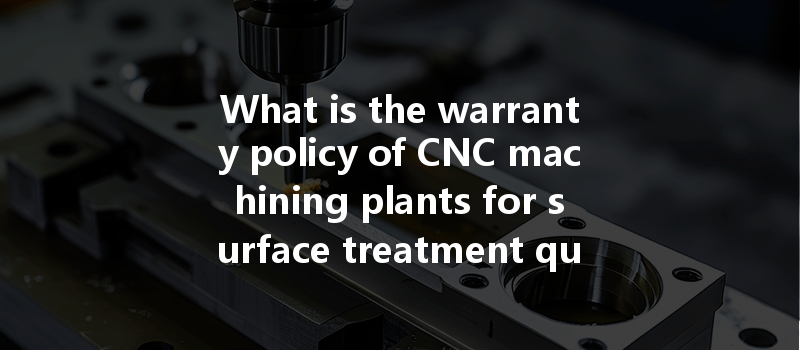In the rapidly advancing world of manufacturing, CNC (Computer Numerical Control) machining has emerged as a key technology for producing high-precision components. With the increasing demand for quality, reliability, and efficiency, it becomes significant to know how the industry upholds these standards through warranty policies. Warranty policies for surface treatment quality, in specific, play a crucial role in ensuring that customers receive not only expertly machined parts but also products that meet stringent surface finishing specifications.
At YL Machining, we recognize the importance of transparency and trust in building long-lasting relationships with our clients. This article will delve deeply into the complex world of CNC machining warranties, exploring what customers can expect from various machining plants, the specifics surrounding surface treatment quality, and the overall implications for manufacturers and businesses alike. We’ll discuss the intricacies of warranty policies, outline essential terms and conditions, and consider how these policies reflect a plant’s commitment to quality and excellence in machining processes.
1.1 Definition of Warranty
A warranty can be defined as a promise made by a manufacturer or seller regarding the quality, durability, and fitness of a product for a particular purpose. In the context of CNC machining, warranties are agreements that outline the level of quality assurance a customer can expect for the products they receive, particularly concerning surface treatments applied to those products.
1.2 Importance of Warranty Policies
Warranty policies serve various purposes, including:
2.1 Coverage Scope
It is essential for customers to understand the scope of what a warranty covers. CNC machining plants often specify the following:
2.2 Duration of Warranty
Most CNC machining plants specify a clear duration for their warranty. Common terms range from 30 days to two years, depending on the complexity of the parts and the manufacturer’s confidence in their surface treatments. It’s vital for customers to inquire about the effective period and whether they can extend the warranty.
2.3 Claims Process
The efficiency of a warranty claims process can significantly impact customer satisfaction. A streamlined process often includes:
3.1 Expectations of Surface Treatment Quality
The surface treatment process can significantly affect the part’s appearance, durability, and functionality. Manufacturers need to ensure that their surface treatments meet industry standards. Some common expectations include:

3.2 Performance Metrics
CNC machining plants often outline no more than a set number of defects allowed within a particular batch. For example, a company might state that no more than 1% of completed parts will have surface treatment defects. These metrics help maintain quality control throughout the production process.
4.1 The Relevance of ISO Standards
ISO (International Organization for Standardization) certification is highly respected within the CNC machining industry. Companies often pursue ISO 9001 certification to demonstrate their commitment to quality management systems.
4.2 Continuous Improvement
Effective warranty policies often include provisions for continuous improvement:
5.1 Advanced Machining Techniques
Innovations in CNC machining technology have led to improved surface treatment processes, reducing the likelihood of defects. As companies incorporate technologies such as automated visual inspection systems and AI-driven quality control (QC), warranty policies may reflect these advancements by providing longer coverage periods or additional assurances against defects.
5.2 Digital Twins and Data Transparency
The use of digital twins, which are virtual replicas of physical parts, allows for real-time monitoring of machining processes. This technology not only enhances the precision of the machining processes but also improves warranty claims:
6.1 Establish Clear Guidelines
CNC machining plants should develop clear and comprehensive warranty policy documents accessible to customers. Transparency about the terms and conditions inspires confidence and paves the way for smoother transactions.
6.2 Offer Training and Support
Educating customers about proper handling and applications of CNC machined parts can minimize claims and enhance customer satisfaction. Offering resources such as manuals or instructional videos demonstrates a commitment to customer success.
In conclusion, a well-structured warranty policy for surface treatment quality is essential for CNC machining plants aiming to foster customer trust and satisfaction. Comprehensive coverage, a clear claims process, adherence to quality standards, and the incorporation of technology are key components that contribute to a robust warranty policy. As YL Machining strives for excellence in all its processes, we understand that warranties are not just promises; they are affirmations of commitment to our customers and their success in their respective industries. By ensuring stringent quality control and consistently evaluating and improving our policies, we remain dedicated to delivering not only well-machined parts but the assurance that comes with them.
As you explore your business needs related to CNC machining, remember that a solid warranty policy is an integral component of your purchasing decision. Take the time to ask questions about your supplier’s warranties and ensure that they will support you long after the machining process is complete. At YL Machining, we’re here to provide detailed answers and exceptional service, ensuring you receive high-quality products with unrivaled support.






